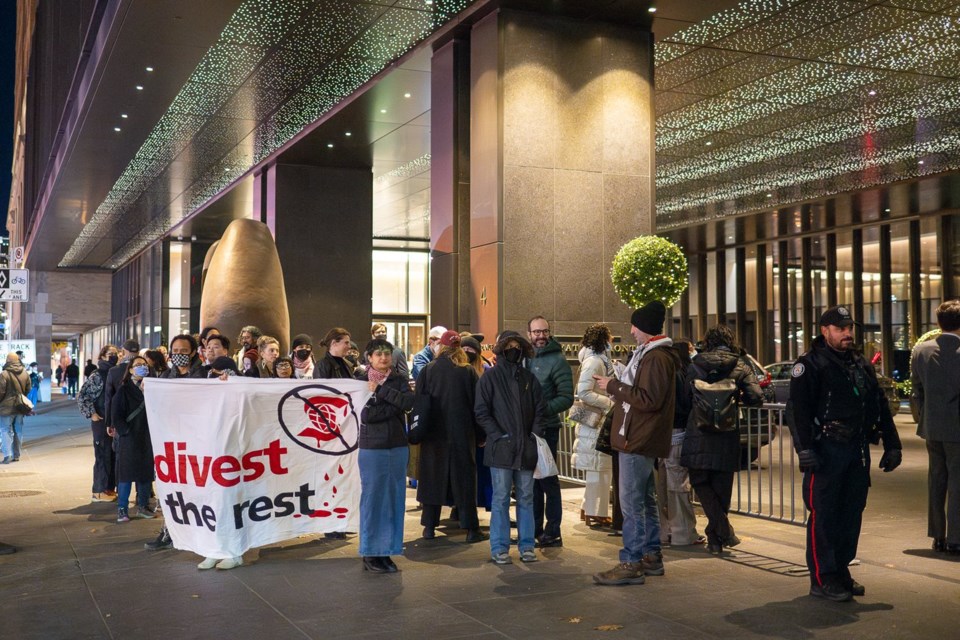TORONTO — Two jurors withdrew from the Giller Prize in the weeks leading up to the book award's split with its lead sponsor Scotiabank, with one saying his writing community feels alienated by the literary institution that faces ongoing boycotts.
Canadian authors Jordan Abel and Aaron Tucker said they dropped out for ethical reasons days after being named to the five-member jury for the $100,000 fiction prize.
"I made a mistake in agreeing to be on the jury and it is against my principles to associate myself with this sponsorship," Tucker said in an emailed statement Monday.
"For the type of writing I do, and want to do in the future, being aligned with such investments would have been hypocritical on my part and actively harmful to members of my community," said Tucker, a novelist and academic whose seven books include the novel "Y: Oppenheimer, Horseman of Los Alamos."
Giller executive director Elana Rabinovitch did not say whether the resignations or ongoing protests had anything to do with an early end to the foundation's decades-long partnership with Scotiabank, only saying of the departures by email: "I wish them well."
The Giller Foundation has faced sustained pressure since November 2023 to cut three of its sponsors over their relationships with Israel, most notably a Scotiabank subsidiary's investment in Israeli arms manufacturer Elbit Systems.
Abel and Tucker were quietly removed from a list of jurors on the Giller website sometime between their announcement Jan. 15 and news of the split with Scotiabank on Monday.
In his statement, Tucker said he was never fully on board with the Giller's funding, but initially thought it was something he could "tolerate" for the sake of uplifting writers.
"As I read more and learned more and listened more, I found myself unable to continue as a jury member. I should have taken the time to do this before I said yes, and not rushed naively into my choice," said Tucker.
Both Tucker and Abel — a Nisga'a writer who most recently won the Governor General's Literary Award for his novel "Empty Spaces" — said they have no plans to return to the Giller jury, despite the end of the partnership with Scotiabank.
The remaining jurors are Dionne Irving, Loghan Paylor and Deepa Rajagopalan, who are all recent Giller finalists.
Many authors and other workers in the books sector have joined a boycott of the Giller, saying they won't submit their works or engage with the November prize until the award also severs ties with sponsors Indigo Books and the Azrieli Foundation.
Protesters object to the Giller's partnerships with Indigo for its CEO's charity that supports Israeli Defense Force officers from abroad, as well as the Azrieli Foundation, in part for its connection to Israeli real estate company Azrieli Group, which has a stake in Bank Leumi. The United Nations Human Rights Office has included Bank Leumi on a list of businesses involved in activities relating to settlements in the occupied Palestinian territory.
The initial protests at the 2023 ceremony came just a month after Israel declared war on Hamas over an attack in which the militant group kidnapped scores of Israelis. Israel says 1,200 people were killed in Hamas' initial attack.
Gaza's health ministry says more than 46,000 Palestinians have been killed in the subsequent bombardment, many of them women and children.
In the wake of the 2023 protest, many authors joined the cause and formed the group CanLit Responds, which has pressured the Giller to end its partnerships.
Two international writers who had been appointed to last year's jury resigned and dozens of authors withdrew their books from consideration for the prize in a movement that grew into a wider boycott.
The novelist Noor Naga, an early member of CanLit Responds, said the timing of Monday's announcement was notable.
"It would have had such a different emotional tenor, a different political resonance, had they chosen to end this partnership earlier on, in a more transparent manner," said Naga, who was shortlisted for the Giller in 2022 for her novel "If an Egyptian Cannot Speak English."
"But doing it now, especially one week after two of their five jurors have stepped down in protest, it feels more like they are trying to save their foundation from dying, frankly."
This report by The Canadian Press was first published Feb. 4, 2025.
Nicole Thompson, The Canadian Press



